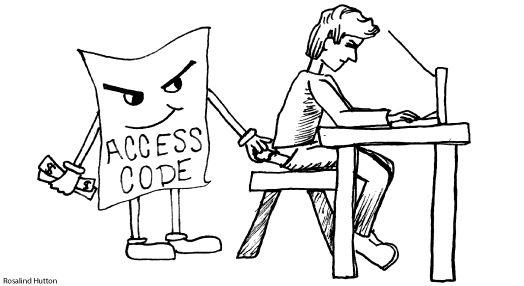For anyone acquainted with higher education’s trend in the last few decades, it goes without saying that attending a four-year university is an egregiously expensive endeavor. Students are nickeled-and-dimed at every turn with overpriced parking passes, ambiguous fees and tuition rates which are rising faster than the rate of inflation, according to Kellie Bancalari with USA Today.
Textbooks are, of course, the boldest offenders of all, draining several hundreds of dollars from already poor students’ pockets every semester. On one hand, the rise of the internet has given students ways to save money in this arena through secondhand sales and other, less legal ways.
On the other hand, this circumvention of what amounts to a stick-up has not sat well with publishing companies. In their efforts to force students to pay them and them alone, access codes were created. Wallets have cried tears of money ever since.
For the sake of educating the lucky souls who have yet to encounter access codes, they generally exist as a paywall for online homework. Some are bundled with e-texts, some are not and some have the option for either.
Pretty much every class that uses them makes them an essential requirement. Most classes I have encountered count homework as at least 15-20% of the overall grade, so not purchasing these access codes automatically disqualifies one from an “A” and even makes achieving a “C” about as difficult as it would have been to achieve an “A” originally.
Unlike textbooks, codes cannot be resold after they are used, and most only give access for six months anyway. This means students no longer really have the option to tough it out without spending any extra money; and with tuition rates being through the roof as it is, it truly is an insult to injury to demand students do this.
Other than something like a lab fee, I do not think students should ever have to pay extra money for a class they are taking. A lot of us barely make it by as it is.
Ann Carrns for the New York Times in 2016, cited a study done by the Student Public Interest Research Groups, and said, “The average cost of a stand-alone access code, purchased at a campus bookstore, is about $100, the report found … Across the colleges and majors analyzed, about a third of courses included access codes among the required course materials, the report found.”
To put this in perspective, for a student taking the minimum full-time load of 12 hours, that student is averaging at least one class with an access code per semester. An extra $100 might not seem like a lot, but when you consider it, it is quite literally a fee to do one’s homework, that price does not look so innocent.
That is just the average.
Some could be spending double this amount per class and have several of these classes each semester, which makes it even worse. There just is not a justifiable reason to charge extra money for something as basic and necessary for education as homework, and to say access codes were created for any other reason than to offset probable textbook sale losses is, to me, a little optimistic.
This is not to say there are not benefits to the utilities access codes provide. Laura McKenna, in a 2018 article for The Atlantic, outlines a few key ones. Freeing up time for professors to meet with students, offering unique and helpful study tools and providing detailed statistics on individual and overall student performance are among the more prominent.
While I do not discount those benefits and certainly do recognize the appeal they bring, I do not believe they justify an extra cost. If anything, universities should shoulder the financial burden and purchase licenses for the use; and if students absolutely must be the ones to shell out money, their inclusion should be optional.
We pay enough, plain and simple; students deserve better across the board. There are definitely bigger fish to fry in the world of higher education, but access codes are the biggest no-brainer to get rid of.
Do it, and do it now, so students everywhere can at least eat something other than ramen for dinner tonight.
Categories:
Access codes are an unnecessary expense

Access Codes
0
More to Discover















































































